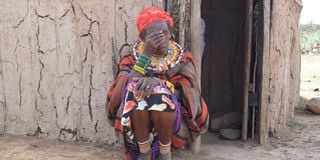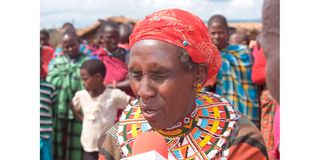Premium
Are we really Kenyans? Poor Samburu locals cry as they suffer at the hands of bandits

Wako Lolmodooni. She has lost two loved ones to bandits; her beloved husband in 2020 and now her son in 2023.
Wako Lolmodooni, 35, looks deflated. Her dry smile is just porous due to her anguish. In her compound, women sat close to one another, crying in low tones, as they stole glances at us when we entered. Ms Lolmodooni’s son had become yet another casualty of the clashes.
Also more than 300 head of cattle had been wiped away in one instance.
“Where is the government? Are we really Kenyans? And if yes, why are we forsaken?” she asks loudly while sobbing.
Ms Lolmodooni is wearing torn dotted Samburu shukas, which she uses as an extension to wipe tears flowing down her face.
Up to this moment, she has two loved ones killed; her beloved husband in 2020 and now her son in 2023. “I have buried enough. Where will I go and hide my face from the persecutions of this world? I have had enough.”
“This is not my wish. I have been pushed to the wall. Who can go and tell the President to come and rescue us?” she asks in a thin-weak voice.
On Wednesday, armed bandits ransacked villages in Loosuk, Samburu West, where they reportedly killed three herders before driving away more than 350 head of cattle.
Ms Lolmodooni’s son was among those who died in the deadly attack. She does not want to recall the horrible experiences that led to the death of her son, and loss of livestock-a widow’s livelihood.
“Bullets were just flying all over. Let me say they [bullets] were just raining, and my son was rained on, unfortunately,” she added.

Wako Lolmodooni whose son died in a cattle raid in Loosuk area Samburu West on October 25, 2023.
Mr David Lesoipa is still bitter. He is among the victims who were hard hit by the recent spate of banditry. His blank stare into space illustrated the pain he and his family were facing after cattle rustlers drove away livestock, their main livelihood.
“I woke up and suddenly I do not have my investment. To us, these livestock are our livelihood. Where do we start?,” Mr Lesoipa posed.
The entire Loosuk belt in Samburu West illustrates a neglected community. Many homesteads and families are reeling from the effects of rampant banditry.
Mr Lesoipa says the daring armed criminals are unleashing terrific gun attacks in villages in full glare of police and military in Nolkerra camp.
“We feel we have been left to die. Our community is in constant pain due to endemic insecurity and cattle rustling from our neighbours,” Mr Lesoipa says.
A cleric, Isaiah Lekapana of Evangelical Christian Church of Africa says there are serious concerns over growing insecurity in Samburu West region.
Mr Lekapana says locals are increasingly getting concerned over attacks and counter attacks and violent killings of innocent people in the region.
According to Mr Lekapana, the recent deadly attacks that happened less than two kilometres from the security camps, lays bare the extent of insecurity in the volatile region.
The church leader now wants security authorities to take a decisive action against the bandits and their supporters in a bid to restore calm in the deadly region.
“We condemn these senseless killings and even theft of livestock. Let the government take decisive action to end banditry once and for all. As a church we stand for peace and harmonious living,” Mr Lekapana says.
What started as cattle rustling, snowballed into defiant terror-like banditry in the region, and access to illicit guns has emboldened the hardcore criminals to raid villages even in presence of military troops.
Widespread endemic poverty and banditry have combined to complicate the insecurity to the people that are already vulnerable.
The daring broad-daylight attacks have now become routine in despite intensified security operations by the police who are backed by military soldiers. Samburu County Commissioner Henry Wafula told The Nation on Thursday that a contingent of security personnel had been deployed in affected areas to restore normalcy.
He urged locals not to retaliate but give security officers time to pursue and arrest the culprits.
“Security troops including Kenya Defense Forces (KDF) and General Service Unit (GSU) are on the ground,” Mr Wafula said.
He revealed that security troops managed to recover about 20 head of cattle that were being driven away by armed bandits.
He said the government’s move to revive the National Police Reservists (NPR) in Samburu, is a game changer in tackling banditry in the region.
NPRs who were recruited since December last year joined other security forces to combat rampant insecurity in Samburu West.
The Kenya Kwanza administration seems to be banking on homegrown solutions in the fight against endemic cattle rustling by investing in community-based intelligence, modern personal protection equipment and kitting security personnel
According to Mr Wafula, the police reservists have worked closely with local police officers to tame cases of banditry in Pura, Longewan, Lkeek Sabuki and the entire volatile border of Samburu and Baringo counties.
Mr Wafula told The Nation that with the NPRs being natives, they have been able respond swiftly any time the cattle rustlers and bandits strike the prone zones.
“The NPRs have added strength to the already existing police units. They (NPRs) are locals who understand the terrain well and also use local dialect,” Mr Wafula said.”




